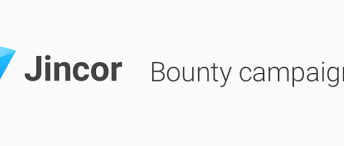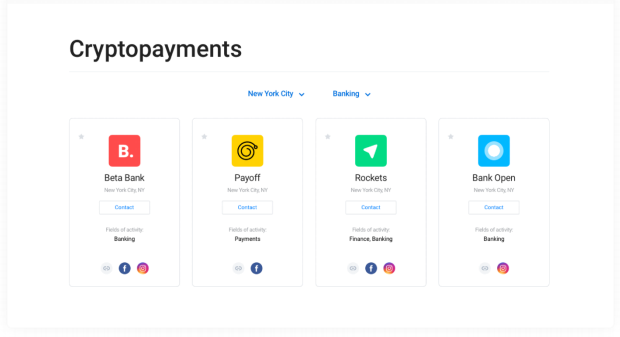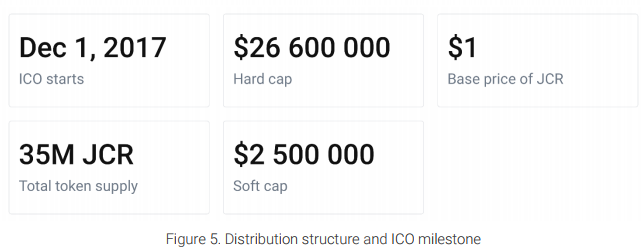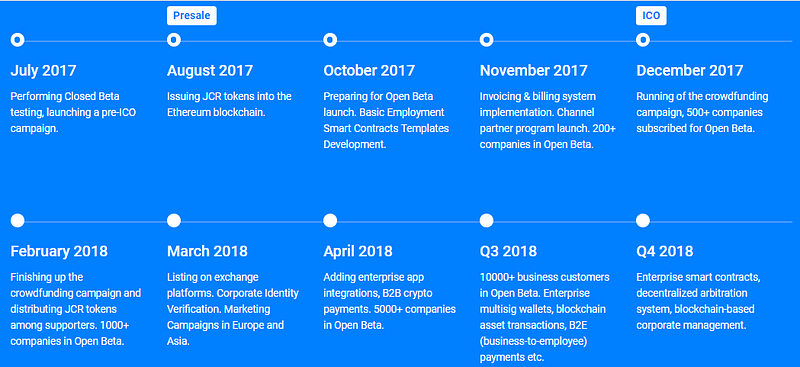
Jincor is a secure, regulatory compliant and breezy-to-use platform, that will allow any business to work with smart contracts and cryptocurrency payments easily with no legal, technical, or operational complications and in a cost-efficient manner.
Vission
While existing solutions offer to solve just one problem at a time, our team is up to build a useful, secure, regulatory compliant, and easy-to-use product based on private blockchain. It will include smart contracts templates applicable for specific areas of business and countries legislation, easy cryptocurrency payments integration, and even a digital arbitration system to work out the right judgements on unclear matters related to smart contracts performance. At the end, Jincor aims to integrate all companies, employees, and business assets into a unified blockchain ecosystem, which will make business relations truly fast, transparent, efficient, and reliable.
Mission
Our mission is to make blockchain technologies as simple and accessible to business as usual means of day-to-day communication and create a unique environment for their evolution and mass implementation in the corporate sector, which will radically reduce the amount of time, effort and money it always takes companies to find and establish valuable business connections, expand market reach, workflow management and execute transactions.
Product
1.Overall structure
Jincor ecosystem is a combination of decentralized (dApp) and classic web applications that let anyone create organizations and manage them on private blockchain based on Hyperledger technologies without any technical insight.
Jincor plan to provide all the functionality that one might need while doing business, including instruments for effective management companies and employees, bills in cryptocurrency, crypto payments, and smart-contracts templates. On top of that, third-party corporate applications can be connected to the Jincor ecosystem in “single-screen mode”. More info about technical details you can find in our Technical Paper. Thus, here we will try to extremely simple describe the mechanisms of work our applications and modules.
2.Companies and participants
Companies module is a web microservice, which includes the profiles of organizations, their departments and the lists of participants. In Jincor ecosystem this module allows to manage the company, create suborganizations, send invitations to employees and define their functional roles within the organization. The public profiles of companies are used to process search queries of Jincor users (we apply elastic search to get more accurate search results). Each organization at Jincor gets a unique digital ID, URL, public profile, list of participants and, optionally, one or more cryptocurrency accounts. The Companies module has an intuitive and user-friendly interface (fig. 2), so that any web user will be on firm ground when using it.

3.Decentralized Apps
Smart Contracts Currently, most global market’s participants are conscious of the advantages of smart contracts. Transaction cost savings, global horizons for any small-scale business, absolute trust between parties — all these benefits make companies look more closely at the possibilities for implementation of smart contracts in their workflow, just in the way it has already happened to cryptocurrencies. However, one of the main hurdles to the mass adoption of smart contracts is high barriers to entry. Programming of smart contracts is a considerable expense for a company and requires the so-called codelawyers with a very rare set of skills to serve on the staff.
How it works: The contract takes force as soon as both parties sign it with e-signatures and requires specific elements in order to be executed automatically. For instance, a first-order requirement is the presence of cryptocurrency accounts of those involved. In other words, the executable code should have unhindered access to the smart contracts objects. Besides that, all of the smart contract conditions should be described mathematically and have a clear execution logic, and this is the reason why the first smart contracts in Jincor will be based on the simplest corporate relations, which involve just a few elements. Given that the code has the full access to the objects of an agreement, its execution and compliance will be handled automatically with account for the fulfillment of the smart contract conditions. To sum up, smart contracts automate contractual business relations and provide their total performance.
First of all (Q4 2018), Jincor team will create smart contracts for the following applications:
Employment Agreement;
Supply Contract;
Service Agreement;
Purchase & Sale Agreement;
Lease;
Insurance Agreement;
Sponsorship Agreement;
Franchise Agreement;
Option Agreement
Arbitrage
In case when the execution logic of a contract is not defined clearly enough, the parties to the agreement may be drown to a dispute. This is particularly so with the cases related to the real-world actions and goods. Offline, there are clear regulatory mechanisms for such issues: should the parties have any disputes related to the contract performance, they can always take legal action. The similar patterns should be implemented within the digital jurisdiction, too. For that very reason we created Jincor Arbitrage, which help settling disputes related to the execution of smart contracts.
Cryptocurrency wallets
is a decentralized module which enables creating of enterprise and individual cryptocurrency wallets in various Blockchain directly. Alongside cryptocurrency transactions these wallets open the door to a wide range of financial instruments used in business, such as bills of credits, overdrafts, insurance of payments and etc.
E-signature
is a decentralized application (dApp), which is embedded in Jincor Messenger interface and allows to securely store, send and sign with digital signatures all kinds of electronic documents (Jincor ecosystem supports several authorized providers of digital signatures) and smart-contracts. All working papers, which are loaded into Jincor Messenger and signed with e-signatures, are written to the blockchain in order to guarantee their authenticity and save revision history. This application, as well as digital signatures, can also be used for signing contracts between the shareholders, employees and other parties.
Crowdsale
To fully unleash the potential of Jincor ecosystem, get a critical mass of businesses involved and reach more global markets as soon as possible, we are going to raise extra funding by running an ICO campaign. We have issued 35,000,000 JCR tokens, 4% of which were sold at pre-ICO in August, and 76% will be put on sale during ICO in December at a starting price of $1. Thus, the total amount of money we are planning to raise comes to $27M. JCR tokens will play an integral part in Jincor’s business model and act as a native currency for all the services provided by the platform.

Legal Full transparency.
Jincor organizational structure includes a parent company incorporated in Cyprus (Jincor Ltd.), its 100% subsidiary operational company in Russia (OOO «Biznes-seti»), 100% subsidiary token sale operational company in Singapore (Jincor Pte. Ltd.) and also SPV for distribution of the option pool to key employees incorporated on British Virgin Islands (Jincor Special Ltd.).
JCR tokens value
We expect that the key to the future growth of JCR tokens value is their constant grow in demand and limited supply: we issue 35,000,000 JCR tokens at once and we do not plan to issue additional tokens in the future. At the same time, the need for JCR tokens will continue to increase, as they are used as a means of payment for the most important (and most required) platform’s features. The probable forecast of JCR token price dependency of the total amount of participating companies on the platform can be found in fig.8. This moderate revenue projection for Jincor platform based on businesses demand for cryptocurrency payment solutions trends and speed of spreading the smart contracts.
In calculations of JCR token equilibrium price were used the following data:
Companies in 2 years from now: 20 000
Average number of staff: 150
Average requirement of one company in JCR tokens: $750
Cycle of JCR tokens: 3 months
Demand of JCR tokens in active trading: 25% (Based on ETH statistics, for more visit Etherscan statistic).


Token distribution

JCR token distribution: To facilitate the development of the platform, reach breakeven and get to the major global markets as soon as possible we are running an ICO campaign.
Tokens distribution will be happening in 2 stages as described below:
- During the ICO Jincor will distribute ERC20 Token Standard JCR tokens developed on Ethereum blockchain. Those will be generated and distributed to all contributors as a placeholder tokens.
- After the full release of Jincor Private Blockchain JCR (ERC20) tokens will give its holders unconditional right to receive the same amount of JCR tokens in Jincor Blockchain. All exchanged ERC20 tokens will be destroyed.
Jincor will issue 35 000 000 JCR tokens, 76% of which (26 600 000 JCRs) will be put on sale.
The base ICO cost of JCR tokens is $1. After the crowdsale, we expect that the value and price of tokens will be growing due to the fixed total token supply (35 000 000 JCR or less, no further emissions) combined with growing demand for JCR tokens from Jincor’s corporate users.
ICO structure
Jincor will issue a total of 35,000,000 JCR ERC20 tokens, 4% of which was sold during preICO, and 76% will be put on sale at a starting price of $1 during the ICO, which will start on December, 1st. The remaining 20% will be distributed among bug bounty participants, Escrow & Advisors and Jincor team — for further development and research (fig.5).


Pool A consists of 4% of the total JCR token supply.Pool A was sold during pre-ICO crowdsale period. Pre-ICO date: Aug 21st 12:00 GMT +3 — Sep 20th 12:00 GMT +3. JCR token price during pre-ICO is $0,25.
Pool B consists of 76% of the total JCR token supply. Pool B is intended to be sold during ICO crowdsale period. ICO date: Dec 1 st 15:00 GMT — Jan 31st 15:00 GMT. JCR token price during ICO is $1.
Pool C consists of 5% of the total JCR token supply. At the end of the Crowdsale period, Pool С will be created and allocated by the Smart Contract System to reward persons acting as advisors of the Jincor Project.
Pool D consists of 3% of the total JCR token supply. At the end of the Crowdsale Period, Pool D will be created and allocated by the Smart Contract System to reward participants of Bounty program.
Pool E consists of 12% of the total JCR token supply. At the end of the Crowdsale period, Pool E will be created and allocated by the Smart Contract System to incentivize Jincor team and ensure a perfect alignment of their individual interests with a long-term performance of Jincor.
Roadmap

Team

Advisors

Details Information :
Website : https://jincor.com/
Whitepaper : https://s3.eu-west-2.amazonaws.com/jincor-ico/whitepaper.pdf
Facebook : https://web.facebook.com/jincorlimited/?_rdc=1&_rdr
Twitter : https://twitter.com/jincor_ico
Telegram : https://t.me/JincorICOeng
Profile Bitcointalk : https://bitcointalk.org/index.php?action=profile;u=1109350




Tidak ada komentar:
Posting Komentar